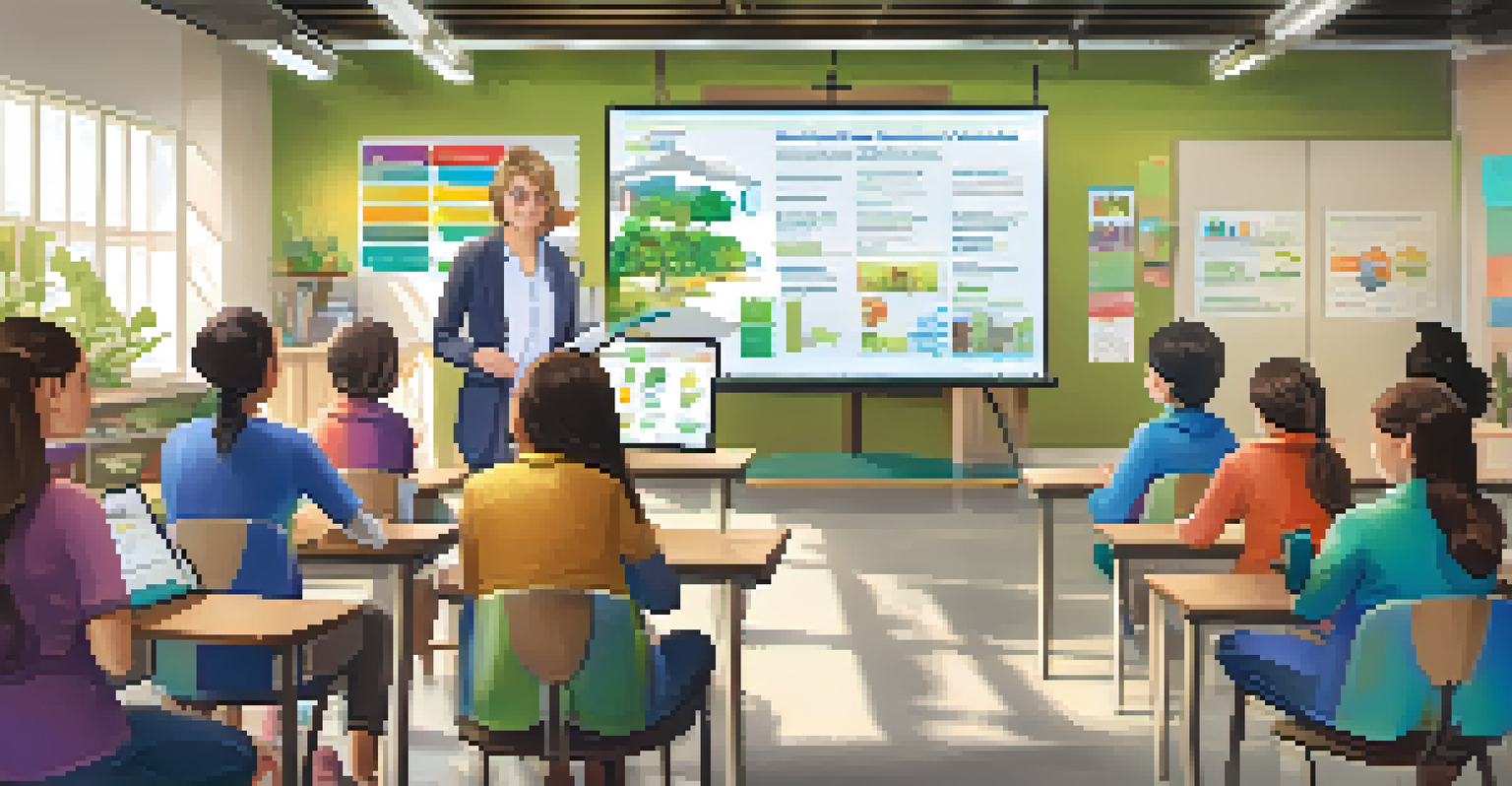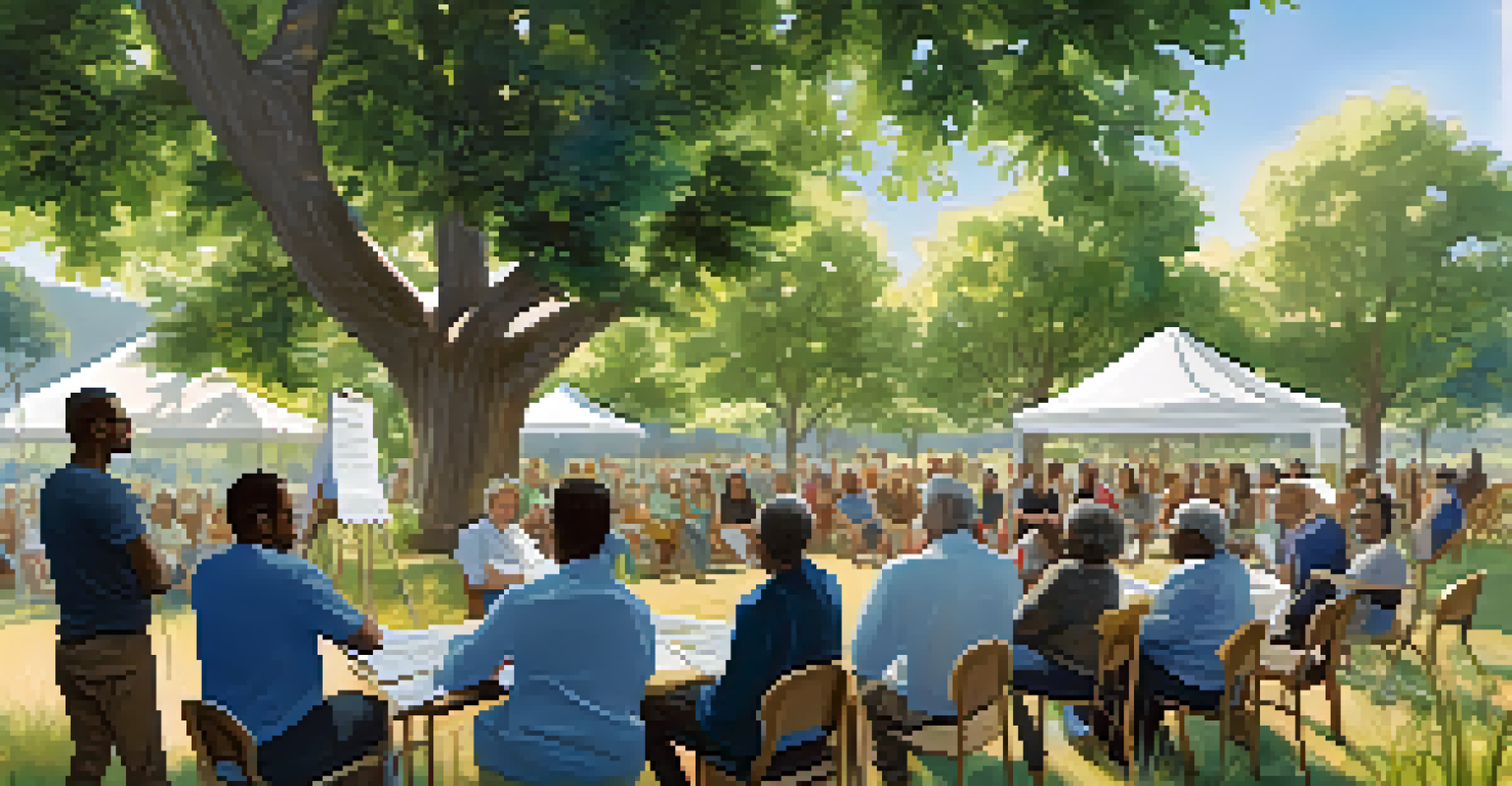Sustainability in Adult Education and Training Programs

Understanding Sustainability in Adult Education
Sustainability in adult education refers to the integration of practices that meet the needs of the present without compromising future generations. This means focusing not only on environmental aspects but also on social and economic dimensions. By applying sustainable principles, adult education can foster lifelong learning that supports community resilience and individual empowerment.
Education is the most powerful weapon which you can use to change the world.
For instance, programs that teach sustainable farming techniques or green business practices encourage adults to think critically about their impact on the environment. This holistic approach ensures learners are equipped with the skills they need to thrive in a changing world. Furthermore, sustainability in education can lead to a more engaged and motivated workforce.
Ultimately, understanding sustainability is crucial for educators and trainers, as it creates opportunities to address real-world challenges. By embedding sustainability into curricula, adult education programs can promote responsible citizenship and encourage learners to adopt sustainable practices in their daily lives.
The Role of Curriculum Design in Sustainability
Curriculum design plays a pivotal role in fostering sustainability within adult education programs. An effective curriculum not only imparts knowledge but also inspires learners to apply sustainable practices in their lives. By integrating sustainability themes across various subjects, educators can create a more relevant and impactful learning experience.

For example, a business training program might include modules on corporate social responsibility or sustainable supply chain management. This approach not only enriches the learning experience but also equips learners with essential skills for a sustainable future. Additionally, incorporating project-based learning allows learners to engage in real-life sustainability challenges.
Sustainability Shapes Adult Learning
Integrating sustainability principles in adult education fosters lifelong learning and empowers individuals to address real-world challenges.
By thoughtfully designing curricula that prioritize sustainability, adult education programs help learners connect theoretical concepts to practical applications. This connection fosters a deeper understanding and encourages learners to become change agents in their communities.
Innovative Teaching Methods for Sustainable Skills
Innovative teaching methods are essential for effectively imparting sustainable skills in adult education. Techniques such as experiential learning, collaborative projects, and digital storytelling can engage learners in meaningful ways. These methods not only enhance retention but also inspire critical thinking about sustainability issues.
The greatest danger in times of turbulence is not the turbulence; it is to act with yesterday's logic.
For instance, using case studies of successful sustainable businesses can provide learners with practical examples of how sustainability works in the real world. Similarly, hands-on projects, like community clean-ups or urban gardening, enable participants to experience the benefits of sustainable practices firsthand. This experiential approach fosters a sense of ownership and responsibility.
Moreover, leveraging technology to create interactive learning environments can make sustainability education more accessible. Online courses and virtual workshops can reach a broader audience, allowing more adults to engage with sustainability concepts, regardless of their location.
Community Engagement and Partnerships
Community engagement is a cornerstone of successful adult education programs focused on sustainability. By partnering with local organizations, educators can create programs that reflect the specific needs and values of the community. This collaborative approach not only enriches the learning experience but also fosters a sense of belonging among participants.
For example, forming partnerships with environmental NGOs can provide learners with access to resources, expertise, and real-world projects. These partnerships can help develop relevant training programs that address local sustainability challenges, such as waste management or conservation efforts. Together, educators and community organizations can inspire collective action.
Curriculum Design Drives Impact
Thoughtfully designed curricula that prioritize sustainability enhance learners' understanding and prepare them to be change agents in their communities.
Furthermore, engaging the community in the learning process encourages a culture of sustainability that extends beyond the classroom. When learners see their education translating into tangible community improvements, it reinforces the importance of sustainability in their daily lives.
Barriers to Sustainability in Adult Education
Despite the benefits of sustainability in adult education, several barriers can hinder its implementation. Limited resources, lack of trained educators, and insufficient institutional support can create challenges for programs aiming to integrate sustainability. Recognizing these barriers is the first step toward developing effective solutions.
For instance, many adult education programs operate on tight budgets, making it difficult to incorporate sustainable practices or materials. Additionally, educators may lack the necessary training to effectively teach sustainability concepts. Addressing these gaps through targeted professional development and resource allocation is essential.
Moreover, some institutions may resist change due to traditional practices or a focus on standardized testing. By fostering a culture that values innovation and sustainability, educational institutions can break down these barriers and create an environment conducive to sustainable learning.
Measuring the Impact of Sustainable Education
Measuring the impact of sustainability in adult education is crucial for understanding its effectiveness and areas for improvement. Evaluation methods can include surveys, participant feedback, and tracking changes in behavior or knowledge. By collecting and analyzing data, educators can gauge the success of their programs and make informed adjustments.
For example, pre- and post-course assessments can provide valuable insights into how well participants grasp sustainable concepts. Additionally, tracking the implementation of sustainable practices in learners' personal or professional lives can highlight the real-world impact of education. This feedback loop is vital for continuous improvement.
Community Engagement is Essential
Collaborating with local organizations creates relevant sustainability programs that inspire collective action and reinforce the importance of sustainable practices.
Ultimately, establishing clear metrics for success can help demonstrate the value of sustainability in adult education. Sharing these outcomes with stakeholders can garner support and resources for further initiatives, ensuring the ongoing evolution of sustainability-focused programs.
Future Trends in Sustainable Adult Education
Looking ahead, several trends are shaping the future of sustainability in adult education. One notable trend is the increasing use of technology, which facilitates flexible and accessible learning opportunities. Online courses, virtual workshops, and mobile learning applications are making sustainability education more reachable for diverse audiences.
Another trend is the growing emphasis on interdisciplinary approaches, where sustainability is integrated across various fields of study. This holistic perspective encourages learners to see the interconnectedness of social, economic, and environmental issues, fostering a more comprehensive understanding of sustainability.

Moreover, the rise of global networks and collaborations among educational institutions is paving the way for sharing best practices and resources. By learning from one another, adult education programs can continue to innovate and adapt, ensuring that they remain relevant in an ever-changing world focused on sustainability.